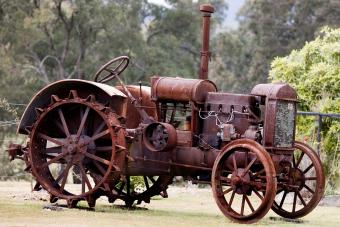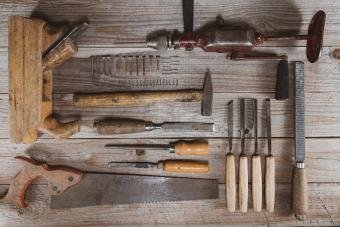
Dibbers, seed fiddles, flails, and chaff cutters are items you may have never heard of, but to many antique farm tool collectors, they're the things that fill their dreams. From the simplest plow to the most complex tractor, there are countless old farm tools to uncover and fall in love with.
Antique Farm Tools

Farm tools date back to the ancient Egyptians, Incans, and other peoples when spades, hoes, and winnowing scoops were made of wood, stone, or bone, and sickle blades were made of flint. Throughout the centuries, farming developments contributed to ever-evolving farm tools that you can find all over the world today.
How to Choose Farm Tools for Your Collection
Naturally, it's not ancient tools that fill the walls and boxes of modern tool collectors. Most farm tool collectors focus on tools from the 18th, 19th, and early 20th centuries. Many collectors limit their farm tool collections to tools that were:
- Used for a specific purpose
- Made during a specific time period or era
- Made by a specific company
- Hand crafted by farmers
- Made of a specific material
How Collectors Categorize Antique Farm Tools
To most antique collectors and dealers, the term farm tools encompasses the general areas of:
- Hand tools such as pitchforks, wrenches, sickles, and rakes
- Implements such as Vicon acrobats, haybobs, and chain harrows used in tilling, plowing, and harvesting
- Farm equipment such as threshers, balers, tractors, and combines
The number of different farm tools from decades and centuries past is well into the thousands, or perhaps more likely tens of thousands. Although that might seem like a lot of different types of farms tools, Mary and P.T. Rathbone of Marshing, Idaho have amassed a collection of more than 3,500 farm implement wrenches alone. The Rathbones own and operate the R. Lucky Star Ranch Farm Museum, where the wrenches are alphabetically displayed by company. With just that many types of farm implement wrenches alone, it is easy to see that the number of unique farm tools is staggering.
Farm Tools From Yesteryear
Here are examples of the many types of farm tools from years past:
- Chaff cutters
- Scythes
- Sickles
- Hoes
- Ditching spades
- Shovels
- Rakes
- Pitchforks
- Dibbers
- Breast ploughs
- Sheep sheers
- Horse hoots
- Potato or beet shovel
- Seed barrow
- Silage knife
- Long handled slasher
- Turnip chopper
- Pruners
- Bagging hook
- Wooden handled crook
- Root crop topping knife
- Pea flail
- Malt masher
- Grain sampler
- Wooden oxen yoke
- Barley hummeler
- Post hole borer
- Wooden seed dibble
- Pig scraper with hook
- Thatcher's stack bat
- Iron post hammer
- Shepherd's fold bar
- Turnip pick
- Reaping or sheaf hook
Tips for Identifying Your Antique Tools
Given the variety of jobs that there are to keep a farm running, there're literally thousands of random tools that've been built to make these jobs easier over the years. Unfortunately for collectors, this means that it can be somewhat difficult to know exactly what type of tool you're looking at, especially when there's no frame of reference to a lot of these tools since they've been replaced by massive industrial equipment. However, the vast majority of tools that you'll come across--so long as you're not collecting directly from an old farm--are relatively recognizable once you have a few identifying pointers.
Easily Recognizable Tools

Thankfully, the vast majority of antique farm tools out there are very easy to recognize, and that's because their designs have basically remained the same for hundreds of years. Thus, these are some of the more common tools that you should (so long as you have a basic working knowledge of what household tools look like) be able to recognize at a glance:
- Hammers - Typically antique hammers were ball pein (meaning they had a round piece at the back of the hammer's head rather than a claw) and came with wooden handles.
- Axes - Antique axes were usually smaller than the axes found lining today's hardware shelves, and were rounded in the way that ball-pein hammers were.
- Wrench - A lot of antique wrenches were actually curved in the middle, so if you find zig-zag looking wrenches, it's likely an older one.
- Hay fork - Hay forks have been around for centuries and are typically made out of wood or later, wood and metal. These multi-pronged tools were used to move hay around.
- Sheep shears - Much thicker and intimidating looking than regular scissors, antique sheep shears were metal and ranged in sizes from the size of your hand to double or triple the size.
- Garden hoe - Antique garden hoes were rounded in the same way that axes and hammers were, partially due to the wear and tear that the metal endured while performing all of the labor.
Practical Farm Tools

Unfortunately, some of the most prevalent and practical farm tools that farmers used a hundred or so years ago aren't that easy to recognize unless, of course, you're a farmer yourself. Thus, these are a few of the more common farm tools that you'll find for sale at auction or in antique stores that you might not recognize at all.
- Wood planes - If you're not a carpenter, the chances are that you have no clue what a wood plane is. Wood planes are tools used to shape wood, and were integral to creating things on the farm. These tools are usually rectangular in shape and have handles on the top. They were run against the pieces of wood to shave it down. The earliest wood planes were made out of wood themselves, with more modern planes being made out of metal.
- Plow - Plows were a fundamental part of antique farming, and whether they were attached to livestock or hand-drawn, they all share the same functional look. Antique plows amounted to triangular pieces that tilled up the dirt with wheels at the front that kept the plow moving. You can find old plows with various combinations of wheel and share sizes.
- Farrier pinchers - Resembling a mix between an ice block holder and a wrench, the farrier pinchers were quite commonly found on historic farms since most American farms had a horse or two to help with the planting, plowing, and harvesting. These metal clamps were used to peel off old horseshoes to keep the horses' hooves in good condition.
Mechanical Equipment

When it comes to more complicated mechanical equipment, unless it's something obvious, like tractors or wagons, it's best to have a professional look over your tools. If these tools aren't in working condition, and you can't experiment with it's moving processes to see what it might have done, then chances are high that you're probably not going to be able to concoct the perfect description to put into Google to give you a label for it.
Resources for Antique and Vintage Farm Tools
The following farm tool price guides and informational books are available from Amazon.
- American Farm Collectibles: Identification and Price Guide by Russell Lewis
- Turn-of-the-Century Farm Tools and Implements by Henderson and Company
- Encyclopedia of American Farm Implements & Antiques by C H Wendel
- Dictionary of American Hand Tools: A Pictorial Synopsis by Alvin Sellens
Additional Resources
Here are a few additional resources to help you better identify and assess the farm tools in your collection:
- Antique Farm Tools lists the 750 piece collection of farm tools collected Peter Charles Dorrington between 1985 and 2001. The antique tools date from 1600 to 1940 and pictures are included.
- The History of Old Time Farm Implement Companies Volumes I and II by P. T. Rathbone of the R Lucky Star Ranch
- Farm Collector - This website and community is dedicated to preserving and celebrating old farm tools and practices.
- Larry and Carol Meeker's Patented-Antiques - This antique shop as a lot of resources on various old tools like wood planes.
A Unique Antique Tool Shed
Naturally, some of the antique farm tools are still put to good use on farms around the country, while others are carefully preserved in private collections and museums or displayed in very unique ways. For example, Mike Druffel, a farmer from southeast Washington, completed this unique tool shed built entirely from antique tools before his death in 2009.
Antique and Vintage Farm Tools for Rustic Living
Collecting antique and vintage farm tools is a fun hobby that families can enjoy together. Not only is it fun hunting for these treasures from the past, it's also fun to have friends and family members try to guess what they were used for on the farm. And, you can incorporate the antique farm tools into your landscaping for a rustic look.







